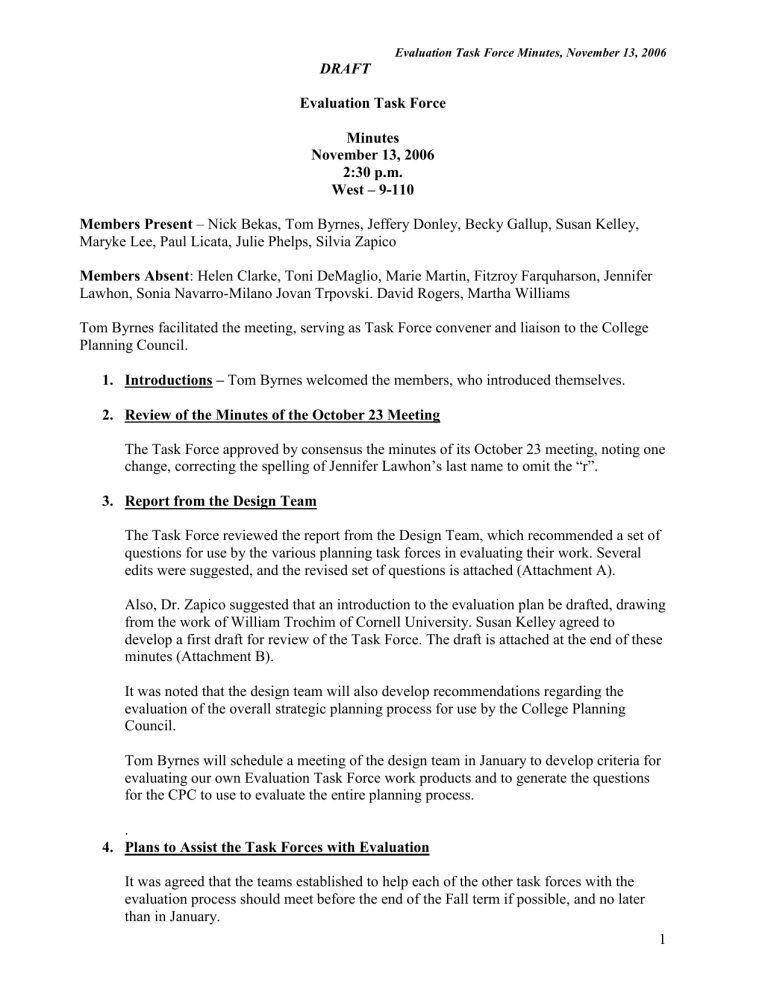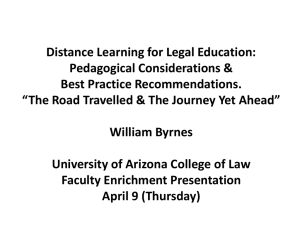Maryke Lee, Paul Licata, Julie Phelps, Silvia Zapico DRAFT

Evaluation Task Force Minutes, November 13, 2006
DRAFT
Evaluation Task Force
Minutes
November 13, 2006
2:30 p.m.
West – 9-110
Members Present – Nick Bekas, Tom Byrnes, Jeffery Donley, Becky Gallup, Susan Kelley,
Maryke Lee, Paul Licata, Julie Phelps, Silvia Zapico
Members Absent : Helen Clarke, Toni DeMaglio, Marie Martin, Fitzroy Farquharson, Jennifer
Lawhon, Sonia Navarro-Milano Jovan Trpovski. David Rogers, Martha Williams
Tom Byrnes facilitated the meeting, serving as Task Force convener and liaison to the College
Planning Council.
1.
Introductions – Tom Byrnes welcomed the members, who introduced themselves.
2.
Review of the Minutes of the October 23 Meeting
The Task Force approved by consensus the minutes of its October 23 meeting, noting one change, correcting the spelling of Jennifer Lawhon’s last name to omit the “r”.
3.
Report from the Design Team
The Task Force reviewed the report from the Design Team, which recommended a set of questions for use by the various planning task forces in evaluating their work. Several edits were suggested, and the revised set of questions is attached (Attachment A).
Also, Dr. Zapico suggested that an introduction to the evaluation plan be drafted, drawing from the work of William Trochim of Cornell University. Susan Kelley agreed to develop a first draft for review of the Task Force. The draft is attached at the end of these minutes (Attachment B).
It was noted that the design team will also develop recommendations regarding the evaluation of the overall strategic planning process for use by the College Planning
Council.
Tom Byrnes will schedule a meeting of the design team in January to develop criteria for evaluating our own Evaluation Task Force work products and to generate the questions for the CPC to use to evaluate the entire planning process.
.
4.
Plans to Assist the Task Forces with Evaluation
It was agreed that the teams established to help each of the other task forces with the evaluation process should meet before the end of the Fall term if possible, and no later than in January.
1
Evaluation Task Force Minutes, November 13, 2006
Susan Kelley will convene a team including Nick Bekas, Jovan Trpovski, and Fitzroy
Farquharson to assist the Data and Situational/Needs Analysis Task Force in evaluating its work.
Tom Byrnes will assist the Communications Evaluation team in setting a meeting. The team includes Helen Clarke, Jeffery Donley, and Marie Martin.
Tom will also assist the Vision, Values, and Mission Evaluation team in recruiting additional members. Currently there is one volunteer, Toni DeMaglio.
Also, it was noted that a team will be formed by early March 2007 to assist the Strategic
Issues, Goals, and Objectives Task Force with its evaluation.
Volunteers for any of the teams forces should contact Tom Byrnes.
5.
Evaluating the Strategic Plan
It was noted that in Spring 2007, a team will be formed to design and recommend an evaluation plan to be included in the final 2008-13 Strategic Plan for use in evaluating the plan as it is implemented.
6.
Time Line for the Task Force’s Work
The task force noted the following time line for its work, with target dates for completion, and noting that a few of the dates may be adjusted by a few weeks to enable teams to meet:
Initial evaluation design for the planning process completed – by the end of
November 2006.
Evaluation designs for the Data and Situational/Needs Analysis Task Force work, for the Communications Task Force, and for the Vision, Values, and Mission
Task Force by mid- December 2006.
Evaluation of Data and Situational/Needs Analysis processes and products completed – by early February 2007
Evaluation of Vision, Values, and Mission statement consideration processes and products – by mid-March 2007
Report to the College Planning Committee, providing a draft evaluation of the planning process, to date, and its products by mid-March 2007
Name the team to assist with evaluating the work of the Strategic Issues, Goals, and Objectives Task Force, by early March 2007
Evaluation of the Big Meeting (March 2, 2007) and the processes used to produce lists of strategic issues and related strategic goals – by the end of April 2007
2
Evaluation Task Force Minutes, November 13, 2006
- Evaluation of process of developing objectives for the strategic goals, in concert with the four governing councils, by mid-October 2007
Development of a draft evaluation design for the Strategic Plan as it is implemented, providing for annual evaluative reports to the College Planning
Council and Trustees, and supporting formative and summative evaluation of the goals and objectives in the plan, by mid-October 2007.
Evaluation of the Strategic Planning document for 2008-13 in terms of the extent to which it meets the design principles, by early November
2007
Report to the College Planning Committee, providing a draft evaluation of the planning process and its products to date, by mid-November 2007
Evaluation of the extent to which each Task Force and Committee met its charge, in the last month of the life cycle of each Task Force (See Task Force Charges)
7.
Task Force Meeting Dates
It was agreed that the full Evaluation Task Force will not meet in January 2007, making time for teams to work instead. The full Task Force will continue with its scheduled meetings on Monday, February 19, 2007, at 2:30 p.m. on West Campus, 9-222, as previously established via Groupwise appointment notification.
It was also noted that Monday continues to be the best day of the week to meet, and the
Groupwise meeting notifications previously sent will continue to be scheduled as follows, all starting at 2:30 p.m., unless conflicts arise that would prevent a majority of members from attending:
March 19, on East 3-113,
April 16, West 9-222,
June 18, East 3-113,
July 16, West HSB-211,
September 17, East 3-113,
October 15, West HSB-211,
November 19, East, 3-113,
January 2008 To be determined.
8.
Task Force Adjournment
The Task Force adjourned at 4:10 p.m.
3
Evaluation Task Force Minutes, November 13, 2006
Attachment A to Evaluation Task Force Minutes of November 13, 2006
Questions for Evaluation of Planning Task Force Work
Draft with Edits Approved by the Evaluation Task Force 11/13/06
Process Questions:
1.
What was most clear about the purpose and directions given to your task force? What was most unclear?
2.
Which stakeholder groups were included in your task force? Which ones were not included? Please explain.
3.
Which stakeholder groups were included in your consultations? Which were not? Please explain.
4.
What methods did you use to collect information for your task force?
5.
What information did you not collect that might have been useful to your task force?
6.
What actions, behaviors and/or strategies did your task force use that helped the accomplishment of your goals? What actions, behaviors, and/or strategies hindered your task force? Please explain.
7.
What presumptions were made in shaping the solicitation of information (questions, surveys, observations, data) that your taskforce requested? Did they make sense? Please comment.
8.
Of the principles created by the Planning Council which did you address? How did they emerge?
Product Questions:
1.
What criteria should be used to evaluate the quality of the products of your task force?
2.
How do the products reflect one or more of the principles established by the Planning
Council?
3.
How will one know that the products add to the learning mission of Valencia?
4.
How do you think your team’s work, including its report and recommendations, will influence the final strategic plan?
Final Question:
Is there something you think should be asked about any aspect of the work of the Task Force that is not listed here? If so, please pose the question and answer it.
4
Evaluation Task Force Minutes, November 13, 2006
Attachment B to the Evaluation Task Force Minutes of November 13, 2006
DRAFT Introduction for the Evaluation Plan :
The Evaluation Task Force consulted Research Methods Knowledge Base
( http://www.socialresearchmethods.net/kb/ ), a 2006 web-based text by William Trochim of
Cornell University, as it developed its evaluation plan for the Strategic Planning process and its products. The following draft has been adapted from that text, and is intended to serve as an introduction to the evaluation plan for our strategic planning efforts. The Evaluation Task Force members will submit comments and edits to Susan Kelley, who will share an updated draft taking those comments and edits into account.
Introduction
Evaluation is the systematic acquisition and assessment of information to provide useful feedback about the work processes and products of our strategic planning efforts.
The goal is to provide "useful feedback" to a variety of audiences interested in the planning process and its products, now and in the future. Feedback is perceived as "useful" if it aids in decision-making about the strategic planning process and products of the College.
The process of evaluating our strategic planning efforts should encourage and support an evaluation culture at the College. What would an evaluation culture look like? What should its values be? The Evaluation Task Force finds useful the description of such a culture proposed by
Dr. Trochim, summarized below:
1. Our evaluation culture will embrace an action-oriented perspective that actively seeks solutions to problems, all within an endless cycle of supposition-action-evidence-revision that characterizes good science and good management.
2. Our evaluation culture will be an accessible, teaching-oriented one that emphasizes the unity of formal evaluation and everyday thought. Most of our evaluations will be simple, informal, efficient, practical, low-cost and easily carried out and understood by non-technicians.
3. Our evaluation culture will be diverse, inclusive, participatory, responsive and fundamentally non-hierarchical . The formulation of problems and potential solutions needs to involve a broad range of constituencies. More than just "research" skills will be needed. Especially important will be skills in negotiation and consensus-building processes.
4. Our evaluation culture will be a humble, self-critical one. We will resist being drawn into making decisions for others, although certainly the results of our work should help inform the decision makers.
5. Our evaluation culture will need to be an interdisciplinary one, doing more than just grafting one discipline onto another through constructing multi-discipline research teams.
6. Our evaluation culture will also be an honest, truth-seeking one that stresses accountability and scientific credibility.
5
Evaluation Task Force Minutes, November 13, 2006
7. Our evaluation culture will be prospective and forward-looking , anticipating where evaluation feedback will be needed rather than just reacting to situations as they arise.
8. The evaluation culture we envision is one that will emphasize fair, open, ethical and democratic processes. We will move away from private ownership of and exclusive access to data.
6

